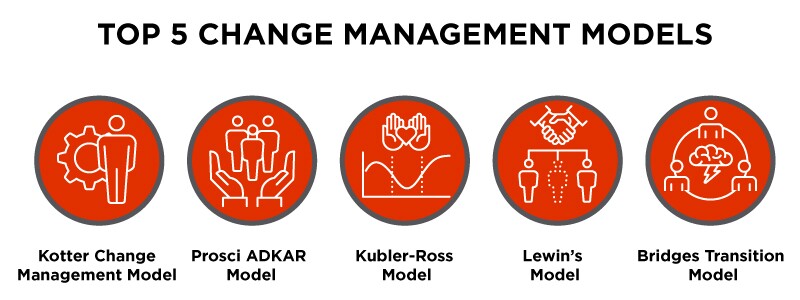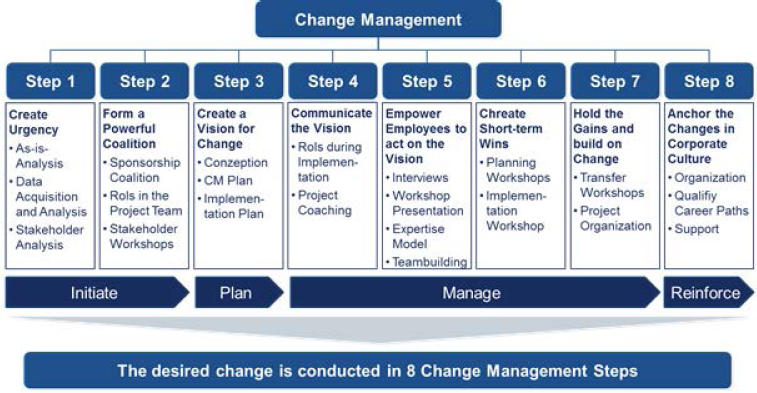In today’s dynamic business environment, change is inevitable. Organizations must continually adapt to shifting market conditions, technological advancements, and evolving customer needs to remain competitive and achieve sustainable growth. This process of adaptation and transformation is known as change management. Business consulting services specializing in change management play a critical role in guiding companies through this complex and often challenging process. Explore the myriad benefits of business consulting services with a focus on change management.
Change is a constant in the business world, often driven by technological innovation, shifting market dynamics, regulatory updates, and changing customer expectations. Therefore, the ability to manage change effectively is essential for maintaining competitiveness and achieving long-term goals. However, navigating these transitions can be complex and full of obstacles. This is where business consulting services specializing in change management provide significant value.
Change management consultants offer a combination of deep expertise, real-world experience, and structured methodologies to support successful transformation. Additionally, they help organizations plan thoroughly, execute carefully, and sustain progress over time. By offering an objective perspective, they guide leadership decisions and align internal efforts. Furthermore, they foster employee engagement, reduce resistance, and help mitigate potential risks throughout the change process. As a result, organizations are more likely to realize their intended outcomes.
Understanding the benefits of business consulting services in change management helps companies make better strategic choices. Additionally, these services can drive meaningful transformations while improving operational performance. By adopting best practices and partnering with experienced consultants, companies gain access to tools that streamline change and strengthen internal capabilities.
Understanding Change Management
What is Change Management?
Change management refers to the structured approach and set of processes used to prepare, support, and help individuals, teams, and organizations in making organizational change. It involves managing the human aspects of change to ensure a smooth transition and achieve the intended benefits.
- Types of Change: Organizational changes can vary in scope and scale, including strategic changes, technological upgrades, process improvements, mergers and acquisitions, and cultural transformations.
- Key Elements: Effective change management involves several key elements, including communication, training, stakeholder engagement, and continuous monitoring and evaluation.
The Importance of Change Management
Change management is critical for several reasons. Therefore, organizations that prioritize it are better equipped to handle transitions smoothly and achieve lasting results.
Minimizes Disruption: Effective change management reduces disruptions to daily operations. Additionally, it helps maintain productivity and business continuity during periods of transition.
Enhances Employee Engagement: By involving employees early in the process and addressing their concerns, change management builds trust and encourages participation. Furthermore, this sense of inclusion fosters ownership and long-term commitment.
Achieves Desired Outcomes: With a structured approach, change initiatives are more likely to be implemented successfully. Additionally, this improves the chances of achieving intended results and delivering measurable value to the organization.
Builds Organizational Agility: A strong focus on change management strengthens a company’s ability to respond to future changes. Therefore, it promotes resilience and long-term adaptability in a constantly shifting business environment.
As a result, organizations that invest in effective change management are more likely to succeed during times of transition. Moreover, they position themselves for continued growth and stability.
Challenges in Change Management
Despite its importance, change management often presents several challenges. Therefore, organizations must prepare to address these issues proactively to support a smoother transition.
Resistance to Change: Employees may resist change for various reasons. For example, fear of the unknown, loss of control, or concerns about how their roles might be affected. Additionally, when individuals feel unprepared or excluded, resistance tends to increase.
Lack of Communication: Poor communication often leads to confusion and mistrust. Moreover, unclear messaging can cause rumors and reduce employee buy-in. Therefore, consistent and transparent communication is essential throughout the change process.
Insufficient Resources: Implementing change usually requires adequate time, funding, and expertise. However, many organizations underestimate these demands. As a result, they may struggle to meet objectives or maintain momentum.
Complexity and Uncertainty: Changes frequently involve multiple departments and moving parts. Additionally, uncertainty about outcomes can make planning difficult. Therefore, companies must adopt flexible strategies and regularly adjust their approach as new challenges arise.
By understanding these common obstacles, organizations can take steps to reduce their impact. Furthermore, working with experienced change management consultants can help overcome these hurdles and lead to more successful outcomes.

Benefits of Business Consulting Services in Change Management
Expertise and Experience
Business consulting services bring a wealth of expertise and experience to change management initiatives. Therefore, their involvement adds significant value to organizations undergoing transformation. Additionally, consultants often work across various industries, giving them a broad perspective and a deep understanding of best practices.
Specialized Knowledge: Change management consultants possess targeted knowledge in areas such as organizational development, human resources, and project management. Furthermore, this expertise allows them to design and implement tailored strategies that align with the organization’s specific needs. As a result, companies benefit from more effective and relevant change plans.
Proven Methodologies: In addition to their experience, consultants use well-established frameworks such as ADKAR and Kotter’s 8-Step Change Model. These methodologies provide structured guidance and reduce the guesswork involved in managing change. Therefore, organizations can approach transformation with greater confidence and consistency.
Lessons Learned: Drawing from their previous work, consultants are well-equipped to anticipate common obstacles. Moreover, they apply lessons learned from past projects to improve outcomes in current initiatives. This proactive approach helps minimize risk and enhances the likelihood of success.
By leveraging the insights and tools provided by experienced consultants, organizations can strengthen their change management efforts. Furthermore, this partnership supports a smoother transition and long-term organizational improvement.
Best Practices:
- Engage consultants with relevant industry experience and a track record of successful change management projects.
- Leverage the consultant’s expertise to design a customized change management plan that aligns with the organization’s goals and culture.
- Continuously collaborate with consultants to adapt and refine strategies based on feedback and changing conditions.
Objective Perspective
An objective perspective is one of the most valuable benefits that business consulting services offer during change management efforts. Therefore, this external viewpoint often adds clarity to complex situations. Additionally, the focus on change management can be difficult to maintain internally due to competing priorities or emotional attachments.
Internal stakeholders are sometimes too close to the challenges to assess them accurately. Moreover, biases or personal interests can cloud judgment and delay action. In contrast, consultants provide an unbiased perspective, helping organizations recognize and address issues more effectively. As a result, decision-making becomes clearer and more strategic.
Impartial Assessment: Consultants begin by conducting neutral assessments of the organization’s readiness for change. Furthermore, they identify strengths, weaknesses, opportunities, and threats without internal bias. Therefore, leaders gain a more accurate understanding of where improvements are needed.
Conflict Resolution: In addition to analysis, consultants help resolve conflicts by facilitating open discussions among stakeholders. Moreover, their role as neutral parties promotes collaboration and builds consensus. This helps keep the change process moving forward with fewer disruptions.
Data-Driven Decisions: Consultants also support decision-making with facts. By analyzing key data and providing actionable insights, they guide leadership toward informed, objective choices. Therefore, organizations are better positioned to implement changes that deliver successful outcomes.
By offering a fresh perspective, consultants enhance clarity, reduce internal friction, and improve results. Furthermore, their impartial approach strengthens change management processes and supports long-term organizational success.
Best Practices:
- Encourage open and honest communication with consultants to ensure a comprehensive understanding of the organization’s challenges and opportunities.
- Use the consultant’s objective insights to challenge assumptions and explore new perspectives.
- Foster a culture of transparency and accountability, where feedback from consultants is valued and acted upon.
Structured Approach and Methodologies
Business consulting services provide a structured and strategic approach to change management. Therefore, they help organizations move through transitions with greater clarity and control. Additionally, by planning and executing change systematically, consultants increase the likelihood of success while reducing potential risks.
Assessment and Planning: Consultants begin by conducting detailed assessments to evaluate the organization’s current state. Furthermore, they identify key drivers of change and define clear, measurable objectives. Based on this analysis, they develop comprehensive change management plans that outline specific steps, realistic timelines, and necessary resources. As a result, the organization starts with a solid foundation for implementation.
Implementation: Once planning is complete, consultants oversee the execution of change initiatives. Additionally, they coordinate all activities to keep progress aligned with the established plan. Therefore, any issues or delays are identified early and addressed promptly to maintain momentum and reduce disruption.
Monitoring and Evaluation: Throughout the process, consultants track progress using defined metrics and KPIs. Moreover, they conduct regular performance reviews to assess results and identify areas for adjustment. This ongoing evaluation enables continuous improvement. Therefore, the organization can adapt as needed and achieve its change objectives more effectively.
By guiding each phase of the process, business consulting services provide stability, structure, and insight. Furthermore, their involvement helps organizations manage change with greater confidence and deliver meaningful results.
Best Practices:
- Follow a phased approach to change management, breaking down the process into manageable stages.
- Develop a comprehensive change management plan that includes clear goals, timelines, roles, and responsibilities.
- Use data and analytics to monitor progress and measure the success of change initiatives.
Employee Engagement and Communication
Employee engagement and communication are critical components of successful change management. Business consulting services help organizations develop and implement strategies to engage employees and communicate effectively throughout the change process.
- Stakeholder Engagement: Consultants identify key stakeholders and involve them in the change process, ensuring that their perspectives and concerns are considered. This fosters buy-in and support for the change.
- Communication Plans: Effective communication is essential to keep employees informed, address their concerns, and build trust. Consultants develop communication plans that outline the key messages, channels, and timing for communication.
- Training and Support: To ensure employees have the knowledge and skills needed to adapt to change, consultants design and deliver training programs and provide ongoing support.
Best Practices:
- Engage employees early in the change process and involve them in decision-making.
- Use multiple communication channels to reach employees, including emails, newsletters, town hall meetings, and intranet portals.
- Provide training and resources to help employees develop the skills and confidence needed to embrace change.
Risk Mitigation
Change initiatives inherently involve risks, including resistance, delays, cost overruns, and failure to achieve desired outcomes. Business consulting services help organizations identify and mitigate these risks, increasing the likelihood of successful change.
- Risk Assessment: Consultants conduct comprehensive risk assessments to identify potential risks and vulnerabilities associated with the change initiative.
- Risk Mitigation Strategies: Based on the assessment, consultants develop and implement risk mitigation strategies, including contingency plans and preventive measures.
- Monitoring and Response: Consultants establish mechanisms to monitor risks continuously and respond promptly to any issues that arise.
Best Practices:
- Conduct regular risk assessments to identify and address new risks as they emerge.
- Develop a risk management plan that includes clear strategies for mitigating and responding to risks.
- Foster a culture of risk awareness and encourage employees to report potential risks and issues.
Sustained Results and Continuous Improvement
One of the key benefits of business consulting services in change management is the focus on achieving sustained results and continuous improvement. Consultants help organizations embed change into their culture. They help with processes. Changes are realized and maintained over the long term.
- Embedding Change: Consultants work with organizations to integrate change into their daily operations, policies, and culture. Become part of the organization’s new way of working.
- Continuous Improvement: Consultants encourage a culture of continuous improvement, where employees are empowered to identify and implement further enhancements. This drives ongoing innovation and performance improvement.
- Evaluation and Feedback: Regular evaluation and feedback are essential to assess the impact of change initiatives and identify areas for further improvement. Consultants establish mechanisms for ongoing evaluation and feedback.
Best Practices:
- Develop a change sustainability plan that outlines how changes will be maintained and reinforced over time.
- Encourage a culture of continuous improvement, where employees are motivated to seek out and implement new ideas and solutions.
- Use feedback and data to drive ongoing evaluation and refinement of change initiatives.
Case Studies and Real-World Examples
Case Study 1: Transforming Organizational Culture
Background: A large manufacturing company was facing significant challenges with employee morale, productivity, and retention. The company recognized the need to transform its organizational culture to create a more positive and engaged workforce.
Solution: The company engaged a change management consulting firm to lead the cultural transformation initiative. The consultants conducted a thorough assessment of the current culture, identifying key issues and areas for improvement.
Implementation:
- Employee Engagement: The consultants facilitated workshops and focus groups to engage employees and gather input on desired cultural changes.
- Leadership Development: A comprehensive leadership development program was implemented to equip leaders with the skills needed to drive cultural change.
- Communication: A communication plan was developed to keep employees informed and engaged throughout the transformation process.
Results:
- Improved employee morale and engagement.
- Increased productivity and collaboration.
- Reduced employee turnover and improved retention.
Case Study 2: Implementing a New Technology Platform
Background: A mid-sized financial services firm was transitioning to a new technology platform to enhance its operations and customer service. The firm needed to ensure a smooth transition and minimize disruptions.
Solution: The firm engaged change management consultants to manage the implementation of the new technology platform. The consultants developed a comprehensive change management plan to guide the transition.
Implementation:
- Stakeholder Engagement: Key stakeholders, including employees, customers, and partners, were involved in the planning and implementation process.
- Training and Support: Extensive training programs were provided to ensure employees were proficient with the new platform.
- Communication: Regular updates and communications were provided to keep stakeholders informed and address any concerns.
Results:
- Successful implementation of the new technology platform with minimal disruptions.
- Enhanced operational efficiency and customer service.
- High levels of employee adoption and satisfaction with the new platform.
Case Study 3: Merging Two Companies
Background: Two healthcare organizations were merging to create a larger, more competitive entity. The merger required significant changes to organizational structures, processes, and cultures.
Solution: The organizations engaged change management consultants to facilitate the merger and ensure a successful integration. The consultants developed a detailed integration plan and provided ongoing support throughout the merger process.
Implementation:
- Integration Planning: A comprehensive integration plan was developed to align organizational structures, processes, and cultures.
- Communication: Transparent and frequent communication was provided to keep employees informed and address concerns.
- Employee Engagement: Employees from both organizations were involved in the planning and implementation process to foster collaboration and buy-in.
Results:
- Successful merger and integration of the two organizations.
- Improved operational efficiency and competitive positioning.
- High levels of employee engagement and satisfaction with the merger process.
Change is an inevitable part of business. Therefore, effective change management is essential for addressing the complexities and challenges that come with organizational transformation. Additionally, companies that prioritize structured change efforts are better positioned to succeed. Business consulting services that specialize in change management offer the expertise and tools needed to guide these transitions smoothly.
These consultants provide more than just advice. They bring an objective perspective, structured methodologies, and proven strategies. Furthermore, they help engage employees, reduce resistance, and mitigate risks. As a result, organizations are more likely to achieve lasting results. Therefore, focusing on change management is important for most companies seeking growth and stability.
Companies that embrace change are more likely to thrive. Moreover, those that apply best practices and work with experienced change management consultants can move forward with clarity and confidence. Therefore, with the right support, businesses can turn change into a strategic advantage and achieve sustainable success. Change management consulting services benefit most small and larger organizations.Talk to a business consultant about your business goals and challenges. Get a consultation. Focus on change management benefits most companies.


